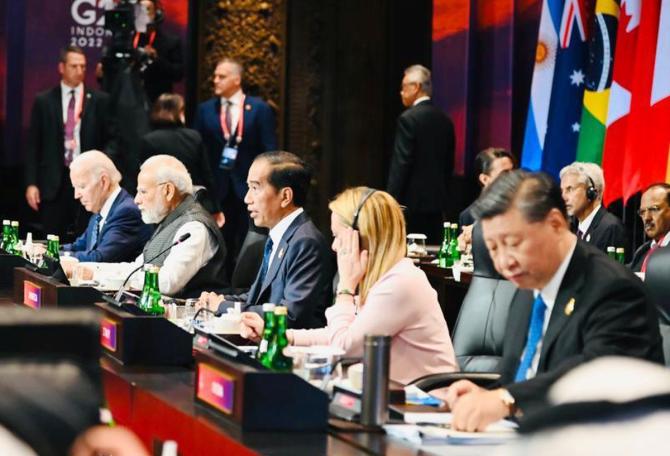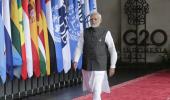The G20 leaders are set to state that today's era "must not be of war" at the summit in Bali, a British newspaper reported on Tuesday, citing a draft communique agreed by diplomats involved in the negotiations to finalise the document.

The key line on the Ukraine conflict in the draft communique almost echoes Prime Minister Narendra Modi's message to Russian President Vladimir Putin in September that 'today's era is not of war'.
There have been a series of negotiations among the diplomats of the G20 member countries over the formulation relating to the Russian invasion of Ukraine. Russia and China are also members of the G-20 which operate on the principle of consensus.
In his bilateral meeting with Putin in Uzbekistan on September 16, Modi said "today's era is not of war" and nudged him to end the conflict.
The Indian delegation played a big role in achieving consensus among member states over the wording criticising the Russian invasion, the Financial Times (FT) said, citing two unnamed officials with knowledge of the negotiations.
Prime Minister Modi and several leaders of the G20 countries touched upon the Ukraine crisis in their remarks at the grouping's summit that began in Bali on Tuesday.
World leaders will state that today's era "must not be of war" at the G20 summit in Bali, according to a draft communique agreed by diplomats that also condemned threats of nuclear weapons use, the newspaper said.
"The use or threat of use of nuclear weapons is inadmissible. The peaceful resolution of conflicts, efforts to address crises, as well as diplomacy and dialogue, are vital. Today's era must not be of war," the draft statement said, according to FT.
The communique was agreed by country delegates on Monday night but must still be signed off by G20 leaders at the two-day summit, the report said.
The G20 "will make clear that Russia's war is wreaking havoc for people everywhere", the report said, quoting a senior US official.
An Indonesian official said discussions on the draft statement were "still dynamic" and might change, it said.
In his address at the summit, Modi on Tuesday referred to his repeated call for resolving the crisis through talks.
"I have repeatedly said that we have to find a way to return to the path of ceasefire and diplomacy in Ukraine. Over the past century, the Second World War wreaked havoc in the world," he said.
Since the Ukraine conflict began in February, Prime Minister Modi spoke to Russian President Putin as well as Ukrainian President Volodymyr Zelenskyy a number of times.
In a phone conversation with Zelenskyy on October 4, Modi said that there can be "no military solution" and that India is ready to contribute to any peace efforts.
India has not yet condemned the Russian invasion of Ukraine and it has been maintaining that the crisis must be resolved through diplomacy and dialogue.











 © 2025
© 2025